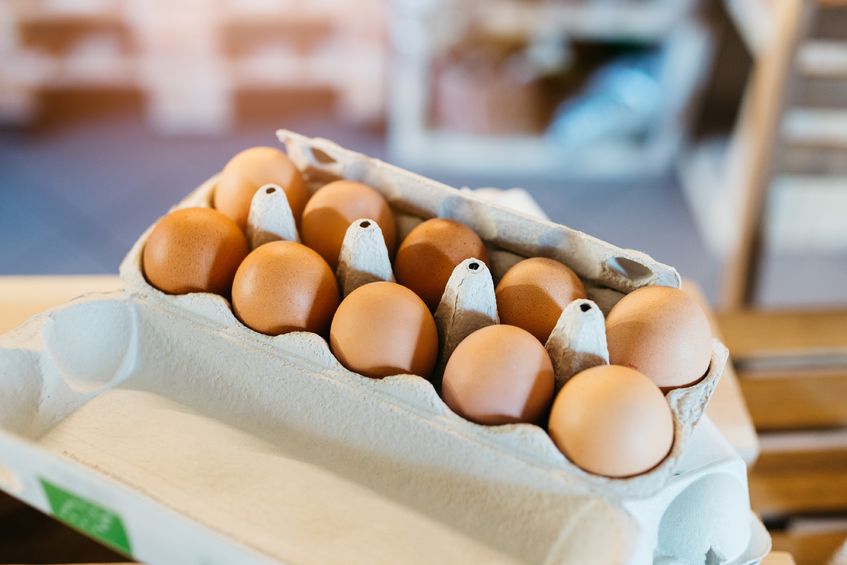
The British Egg Industry Council (BEIC) is drawing up a list of approved pesticides following the recent fipronil scandal.
BEIC chief executive Mark Williams told FarmingUK that the list of approved pesticides would be part of the new Lion code, which is currently under review.
Anyone producing eggs under the Lion label would only be able to use pesticides from the approved list.
The move by BEIC comes after hens in the Netherlands were found to have been treated for red mite with a mixture that included fipronil - a chemical that is banned from use on animals in the human food chain.
Millions of hens have been culled, millions of eggs have been destroyed, eggs and prepared foods recalled and two people have been arrested following a criminal investigation in the Netherlands.
In the United Kingdom, the Food Standards Agency (FSA) said that some 700,000 potentially contaminated eggs had been imported from Europe.
A number of prepared food lines were removed from supermarket shelves but no evidence has been found of fipronil being used on British layer farms.
'No evidence'
Although UK egg producers appear to be in the clear, Mark Williams said that Lion had decided to create an approved list following the scandal on the continent.
"We have got a lot of producers who are looking more closely now at what they have been using, although we have found no evidence of fipronil," said Mr Williams.
"We have had producers asking, so we are working towards producing a list of approved pesticides. HSE (the Health and Safety Executive) controls all that but we will be creating a list of pesticides that can be used under the Lion code. We already have one for disinfectant."
Egg producers in the Netherlands are facing financial ruin as a result of a threat by supermarkets and food companies to pursue them for damages and lost profits arising from the fipronil scandal.
Farmers' representatives in the Netherlands say that producers' losses are already more than €60 million and they are continuing to grow.
Some 144 farms remain under restriction, unable to market their eggs, in the Netherlands. Restrictions are still in place on 30 farms in Belgium, 10 in Italy and seven in Germany.
'Unlikely risk'
The FSA has said that 85 per cent of the eggs eaten in the UK are produced in the UK and has moved to reassure consumers that there is unlikely to be any risk to public health.
It says the eggs used in the prepared foods that have been withdrawn from sale in the UK were probably produced on the affected Dutch farms before those farms were shut down. UK eggs have been tested for fipronil and all results so far have been clear.
FSA chairman Heather Hancock said: “Our advice remains clear - there’s no need to change how you buy or consume eggs.
“We are responding very quickly to any new information, to ensure that any products left that contain egg from the affected farms is withdrawn immediately. We're doing this because fipronil is not authorised for use in food producing animals, not because we are concerned about any risk to health.”
Professor Alan Boobis, chairman of the independent Committee on Toxicity said: “Even at the highest level found, consumption of one or two meals containing these eggs in a day would not pose a danger.
“It is very unlikely that anyone in the UK would have been exposed to anything close to this, and there is no reason for consumers to be concerned.”
Buy British
Egg industry leaders in the UK have repeated their calls for retailers, food processors and foodservice companies to buy British eggs to avoid any risk.
Ian Jones, chairman of British Lion Egg Processors, said: "Consumers clearly want retailers, caterers and food manufacturers to use good quality British ingredients that are produced to high standards of food safety, but in some prepared foods this is not the case."
At the annual conference of the British Free Range Egg Producers Association (BFREPA), Amanda Cryer of the British Egg Information Service (BEIS) said that fipronil crisis was an opportunity for the UK egg industry to press the cases for domestic egg product.
"I think it's opened a lot of people's eyes to the hidden egg in some of those products that were on sale containing eggs from Holland and that does give us a really good opportunity to push that message home, which we have been trying to do but egg in product is disguised a bit more than buying shell egg. It is easy for people to country of origin issue but that is now very high up the agenda."
'Stringent standards'
BFREPA chief executive Robert Gooch has also called for both retailers and manufacturers to buy British eggs produced under quality codes like Lion and Laid in Britain.
"British egg producers follow stringent production standards to ensure that what they produce is perfectly safe and nutritious for consumers to eat," he said.
"Consumers want safe, traceable food and we have ready-made schemes which delivers that in the form of the British Lion Code and Lain in Britain."
Egg imports have been connected with a series of food and health scares over recent years.
